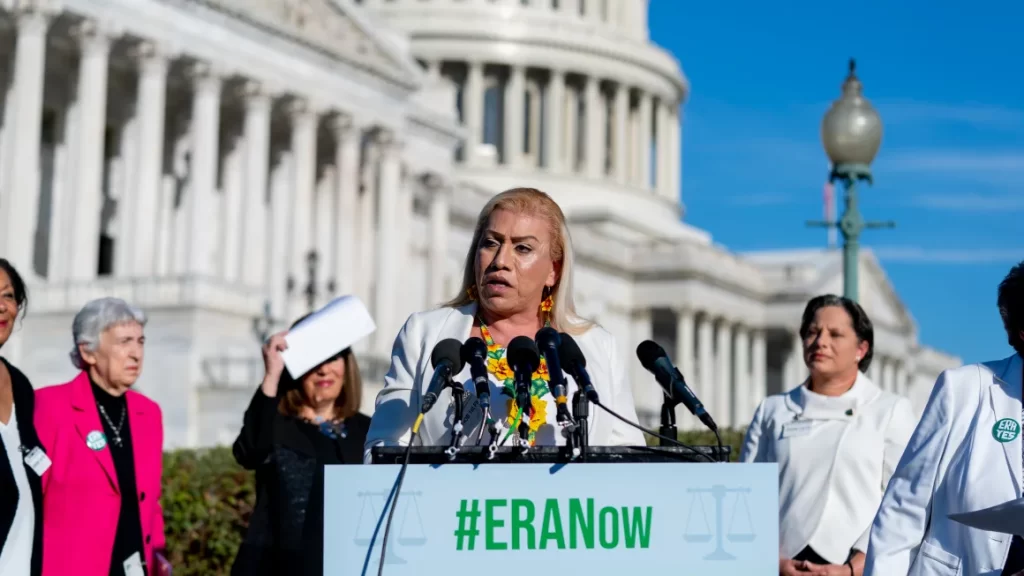On a festive December evening in West Hollywood, Bamby Salcedo, surrounded by trans immigrants and allies, reflected on the stark contrast to her early days in the U.S. Decades ago, she struggled with homelessness, incarceration, and detention. These experiences fueled her dedication to co-founding the TransLatin@ Coalition, a support network for trans and gender non-conforming immigrants.
However, with the Trump administration’s policies, Salcedo and her community now fear a return to marginalization. They express concern that the federal government is specifically targeting transgender individuals.
While anti-trans violence persisted during the previous administration and saw high deportation rates, many feel that the current administration is singling them out with increased hostility.
“It’s very clear that the federal government has a specific initiative to target members of our community,” Salcedo stated. Despite the Coalition’s efforts to provide support, government rhetoric significantly impacts their community’s morale.
The Trump administration has enacted policies such as banning transgender individuals from military service and ending federal support for gender transitions in minors. These actions followed campaign pledges to target transgender communities.
Since Trump took office, calls to the TransLatin@ Coalition have doubled as individuals seek clarity on these policies’ impact.
Approximately 174,200 transgender immigrants reside in the U.S., with a significant portion identifying as people of color, according to a 2024 report from the Williams Institute. Experts note that these overlapping identities place them at heightened risk.
“It’s important to consider that trans immigrants are experiencing an enhanced experience of discrimination, because we have in our country this anti-trans and anti-immigrant rhetoric of policies,” said Luis R. Alvarez-Hernandez, an assistant professor at Boston University School of Social Work.
Primary Concerns: Deportation and Detention
Many transgender immigrants fled persecution in their home countries, sometimes joining migrant caravans. Deportation poses a life-threatening risk.
“I think ultimately the biggest fear is for them to lose their lives, right?” Salcedo said.
Globally, hundreds of trans and gender diverse individuals were killed between October 2023 and September 2024, with a significant majority in Latin America and the Caribbean, according to the Trans Murder Monitoring project.
During the previous Trump administration, trans immigrants feared returning to violent conditions. Detention centers present similar terrors, with reports of inadequate medical care and discriminatory treatment.
Li Ann Sanchez, a transgender woman and rights advocate, described her detention experience as deeply traumatizing, with verbal abuse from officials.
A 2015 ICE memorandum mandated safe detainee placement, including healthcare access. However, a 2024 report from Immigration Equality criticized this memo as insufficient.
Advocates urge the release of LGBTQ+ detainees, citing heightened assault risks.
Salcedo founded TransLatin@ Coalition partly due to her and others’ detention experiences, including physical assaults.
A recent executive order mandates federal agencies to not house transgender women in women’s facilities and discontinues gender-affirming care. A judge has temporarily blocked this order, citing safety concerns.
Increased Violence and Economic Instability
Casey Carter Swegman of Tahirih Justice Center noted heightened vulnerability for trans immigrants, with abusers using deportation threats to silence victims.
“The more we see attacks on these programs and these legal pathways to safety that exist under the law, the more transgender survivors in particular are going to be less and less likely to come forward for help,” she said.
Transgender protections have been rolled back, and hate crimes have risen. Sanchez reported increased attacks within her community, urging members to travel in groups.
Economic insecurity remains a concern, with trans individuals facing lower employment and income rates.
“If people are not able to be visible and not able to obtain employment in order to really live a normal life, you know, that’s also a fear that is installed in our communities, right?” Salcedo said.
Advocates stress mental health support, citing rising suicide risks among LGBTQ+ individuals.
Despite challenges, trans immigrants remain resilient, drawing strength from community support.
“As long as we continue to support each other and uplift one another, and understand that this too shall pass … The hope should never die,” Salcedo concluded.



